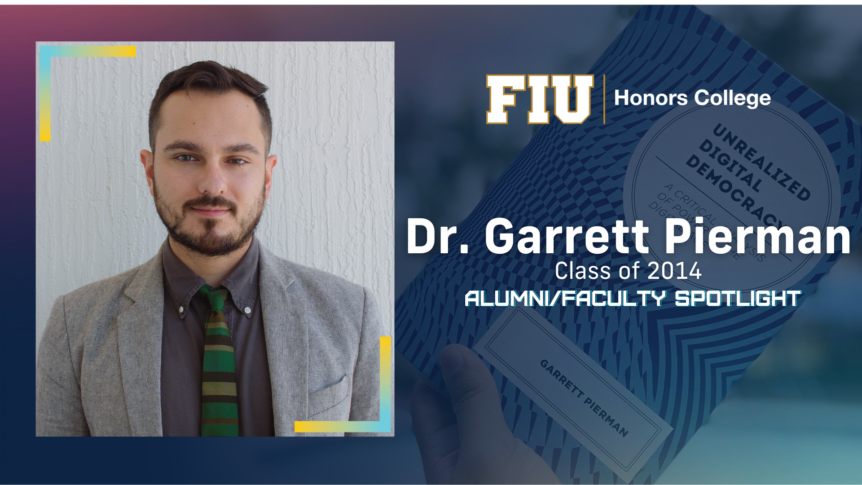The Honors College at Florida International University takes great pride in acknowledging the remarkable achievement of Honors Alumnus and Faculty Fellow Garrett Pierman, Ph.D., who has recently transformed his dissertation into a published book.
In reflecting on his time as an undergraduate at the Honors College, Dr. Pierman fondly recalled his early experiences that shaped his academic journey. In 2011, at the start of his undergraduate years, the Honors College became an integral part of his educational path. Dr. Pierman decided to major in political science during this time, and his first Honors course, which explored Plato’s Republic through an interdisciplinary lens, deepened his interest in political philosophy. In his second year, he had the opportunity to take a course taught by the then-Assistant Dean, Dr. Juan Carlos Espinosa, which greatly influenced him and led to Dr. Pierman becoming Dean Espinosa’s student assistant during his final undergraduate year. Together, they worked on various projects, including laying the groundwork for what later became HEARTS (Honors Education in the Arts). Furthermore, Dr. Pierman collaborated with Assistant Director of Undergraduate Research Allen Varela on organizing the Florida Undergraduate Research Conference (FURC), which emphasized the Honors College’s dedication to undergraduate education. These experiences were pivotal in Garrett’s decision to pursue a career in education, undergraduate research, and a Masters & Doctoral degree in Political Science.
Garrett’s dissertation delves into the intricate relationship between the internet and politics, specifically focusing on how it shapes elections and political behavior. He was driven by the internet’s profound impact, particularly evident during the 2016 presidential election. His research unveiled the internet’s unique nature as a feudalized space in which corporations’ drive for profit through digital platforms provides a fertile ground for engagement that generates revenue, but not necessarily truth. While this engagement might appear to be a public conversation, these conversations occur in environments that are increasingly privatized. This dual identity as a collection of something in between public and private spaces the internet an ideal breeding ground for the dissemination of information, misinformation, and the formation of echo chambers. Garrett’s research explored the consequences of this hybridity, including the proliferation of fake news and conspiracy theories, often leading to radicalization and extreme actions, as witnessed during events like the January 6th insurrection.
Garrett’s work illuminated the dynamics of online spaces, revealing their capacity to captivate and radicalize individuals, sometimes pushing them towards extreme acts of violence. The constant engagement, sensationalism, and echo-chamber effects of online platforms could intensify emotions, impair critical thinking, and lead to poor decision-making. In summary, Garrett’s research provided a comprehensive examination of how the internet influences contemporary politics and contributes to divisive and potentially dangerous political behaviors.
His advice for students interested in getting into research, particularly in the field of political science and related areas, emphasizes the following points:
- Start: The first step is to begin. Don’t wait for the perfect idea or the ideal time. Start with an idea or question that genuinely interests you and explore it.
- Seek Opportunities: Explore opportunities to engage in research within your classes and beyond. Many professors are open to students pursuing research topics that align with their interests, even if it doesn’t perfectly match the course requirements.
- Learn from Rejection: Rejection is a part of the research process. It can be discouraging, but it’s essential to understand that it happens to everyone. Rejection can often lead to improvement and refinement of your research.
- Intellectual Contribution over Ego: Focus on the intellectual contribution you can make through your research rather than personal validation. It’s about contributing to the collective knowledge, and it’s okay to be wrong or have your ideas challenged.
- Collaborate and Seek Mentorship: Collaborate with professors, peers, and mentors who can guide you through the research process. Seeking advice and feedback from experienced researchers can be incredibly valuable.
- Persistence: Keep at it. Research is often a long and iterative process. You may have to write multiple drafts and revise your work many times before it’s ready for publication.
Research starts with curiosity and the willingness to explore and learn. It’s a journey of discovery, and the most important thing is to take the first step. Whether you’re an Honors student or someone passionate about a specific field, research is a valuable way to deepen your understanding and contribute to the body of knowledge in your area of interest.
Dr. Garrett Pierman’s book, Unrealized Digital Democracy, is available on Amazon and the Lexington Books website, serving as a valuable resource for those intrigued by the intersection of the internet and politics. Additionally, the dissertation version will become accessible through FIU’s Digital Commons in 2024, offering a valuable resource for students and researchers interested in this field.

